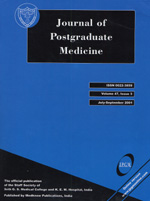
|
Journal of Postgraduate Medicine
Medknow Publications and Staff Society of Seth GS Medical College and KEM Hospital, Mumbai, India
ISSN: 0022-3859
EISSN: 0022-3859
Vol. 46, No. 4, 2000, pp. 293-296
|
 Bioline Code: jp00098
Bioline Code: jp00098
Full paper language: English
Document type: Research Article
Document available free of charge
|
|
|
Journal of Postgraduate Medicine, Vol. 46, No. 4, 2000, pp. 293-296
| en |
Review Article - Acute Renal Allograft Rejection: Progress in Understanding Cellular and Molecular Mechanisms
Divate SA
Abstract
The application of molecular biology tools to investigate the molecular basis of acute allograft rejection has unravelled many complex mechanisms and improved immunosuppressive therapies leading to significant improvements in graft survival. The "indirect" pathway of antigen presentation has emerged as more important, than the traditional "direct" pathway, for allorecognition by T cells. The recognition that CD28 costimulation is essential for allorecognition has provided novel targets for immunotherapy such as CTLAImmunoglobulin. Understanding the role of Th1 and Th2 subsets of T helper cells, the cytokine network and cell adhesion molecules in the mediation or prevention of graft rejection has opened new avenues for research into therapeutic modalities. The ideal objective would be to identify the mechanisms of graft destruction and design specific inhibitors. This review highlights recent advances in the understanding of acute renal allograft rejection which may have future potential for rational design of new immunosuppressive strategies.
Keywords
Renal transplantation, acute rejection, T lymphocytes, allorecognition, costimulatory molecules, Th1 cells, Th2 cells, cytokines, adhesion molecules
|
| |
© Copyright 2000 Journal of Postgraduate Medicine. Online full text also at http://www.jpgmonline.com
Alternative site location: http://www.jpgmonline.com
|
|
